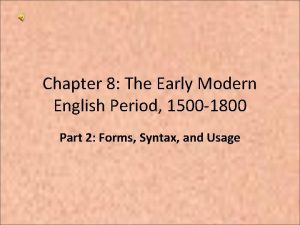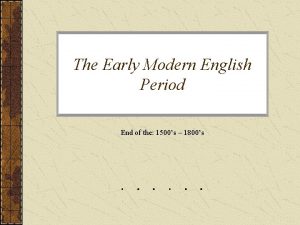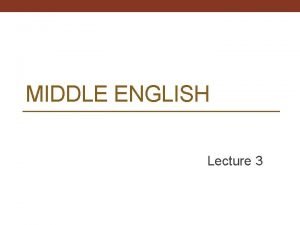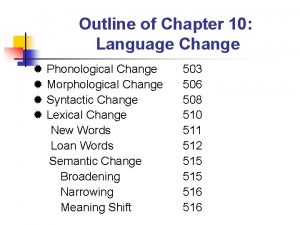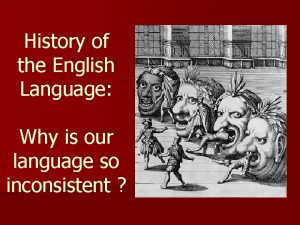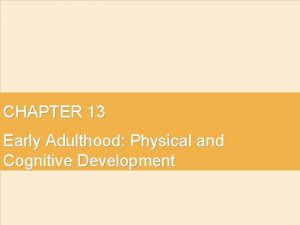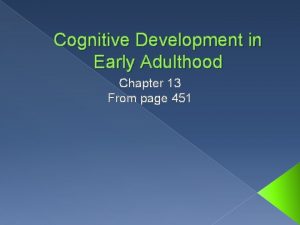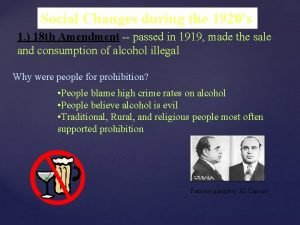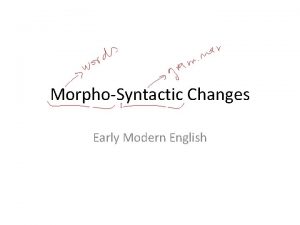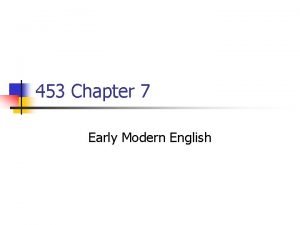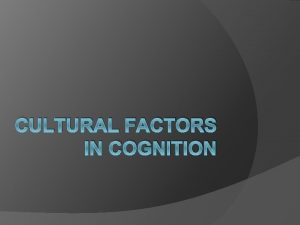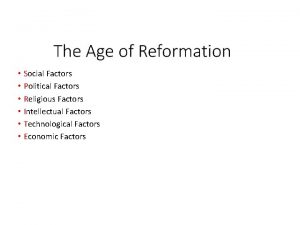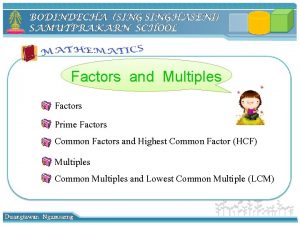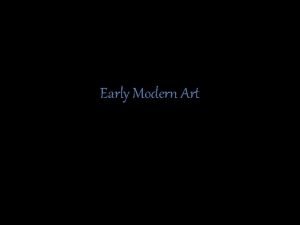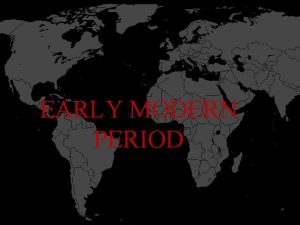Early Modern English The Language Changes Cultural factors














- Slides: 14

Early Modern English

The Language Changes Cultural factors: – Printing (introduced by William Caxton in 1470) – Education becomes more widespread – Culture of mobility and exploration begins to influence the development of the language Principal effects: – Borrowing: from Latin and Greek, from Romance languages, from Native American languages

The Final Stage of Major Change Noun: Only inflections left plural and possessive singular Adjective: No more gender or case marking Pronoun: Rise of ‘you’ singular; innovation of its; who as a relative pronoun Verb: Loss of –eth ending in 3 rd person singular Auxiliary verb: Rise of “do”

You and Politeness Thou and you become associated with familiarity within a complex politeness system in the thirteenth century (1200 s). – Why would this date be significant? What else is happening in the history of the language? Quakers in 1600 s begin using “plain speech” (thou for everybody). – George Fox: “Moreover, when the Lord sent me forth into the world, He forbade me to put off my hat to any, high or low; and I was required to Thee and Thou all men and women, without any respect to rich or poor, great or small. ” In a pamphlet, accused the Pope of forcing the politeness distinction on English.

Its vs. it’s: Or, what happens when your professor and textbook disagree. Baugh and Cable: p. 244: “It was perhaps inevitable that the possessive of nouns (stone’s, horse’s) should eventually suggest the analogical form it’s for the possessive of it. (The word was spelled with an apostrophe down to about 1800). ” – According to Literature Online before 1800: 10943 tokens of it’s, not sorted 57847 tokens of its, not sorted – Before 1700 3608 tokens of it’s, not sorted 12162 tokens of its, not sorted – Before 1600 170 tokens of it’s, not sorted 490 tokens of its, not sorted

Parataxis and Hypotaxis Parataxis is the juxtaposition or coordination of roughly equal syntactic phrases most characteristic of Anglo. Saxon style: Hypotaxis is the regular subordination of clauses one to another most characteristic of Latinate style; hypotaxis requires a rich inventory of subordinating conjunctions and relative pronouns.

Relative Pronouns Until EME, that was the principal relative pronoun. – Which predominates in all relatives, especially in translations. Used only for persons rarely after 1611. See Richard Steele, Spectator 58 – Whom appears as a relative in the sixteenth century, while who appears later and becomes standard for personal forms. – A zero-relative is rarely found in the sixteenth century.

The Do-Auxiliary How do you make a question? EME do had a variety of functions: – Pro-verb (comparable to a pronoun): Hamlet It will not speake: then will I follow it. Horatio Doe not my lord. – Full verb: Doe wrong. – Causative verb: Thou dost make me slack. – Tense operator: He ded do shewe to me ‘he had it shown to me. ’

Empty ‘Do’ From late fifteenth century onward we see the rise of an emphatic or ‘empty’ do: – So that I say, /He ha's borne all things well, and I do thinke, /That had he Duncans Sonnes vnder his Key, / (As, and't please Heauen he shall not) they should finde /What 'twere to kill a Father: Corresponding period sees development of modal auxiliaries

Verb Movement Modal auxiliaries develop fully in Middle English (may, might, will, shall, ought): Soueren, your arend it xall be don ful redy / In alle þe hast þat I may. /For to fullfyll your byddyng / I woll nat spare, nother be nyth nor be day! Questions are formed by moving the verb to the beginning of the sentence: Am nat I þe grettest governowur?

Auxiliaries in Questions In EME, two yes/no question constructions found: Seest thou these things? V S O Do we fear in vain Thy boasted thunder? Aux S Inf Vb O Two corresponding objective question constructions. What say you? O V S What may this mean? O Aux S Inf Vb

Do in Questions Do comes to function in questions as modal auxiliaries do, making the system internally consistent. Why dost thou spurne against the fates? Dost thou her godhead feare? Not entirely consistent or predictable until late in the EME period. Hop'st thou my cure? Do all they denie her?

Lexicon Increased focus on education and social mobility leads to efforts to enrich English vocabulary. Thomas Elyot: “I intended to augment our Englyshe tongue, wherby men shulde as well expresse more abundatntly the thynge that they conceyved in theyr hartis, . . . Havyng wordes apte for the pourpose: as also interprete out of greke, latyn or any other tongue into Englysshe as sufficiently as out of any one of the said tongues into an other. ”

Inkhorn Terms and Semantic Change Some borrowings were purely literary, only for writing, hence “inkhorn” terms. P. 218, Thomas Wilson. Some authors used native strategies, such as compounding. Learned terms, frequently borrowed from Latin or Greek, support the pejoration or native terms.
 Early modern english syntax
Early modern english syntax Early modern english
Early modern english Accent and dialect english language a level revision
Accent and dialect english language a level revision Early modern english period
Early modern english period Early modern english
Early modern english Middle english examples
Middle english examples Elizabeth mulroney
Elizabeth mulroney Physical change examples
Physical change examples Tumoxan
Tumoxan Old english vs modern english
Old english vs modern english Old english vs modern english
Old english vs modern english Young adulthood physical development
Young adulthood physical development Labouvie-vief pragmatic thought
Labouvie-vief pragmatic thought Commitment within relativistic thinking
Commitment within relativistic thinking Social/cultural changes during the 1920's
Social/cultural changes during the 1920's

